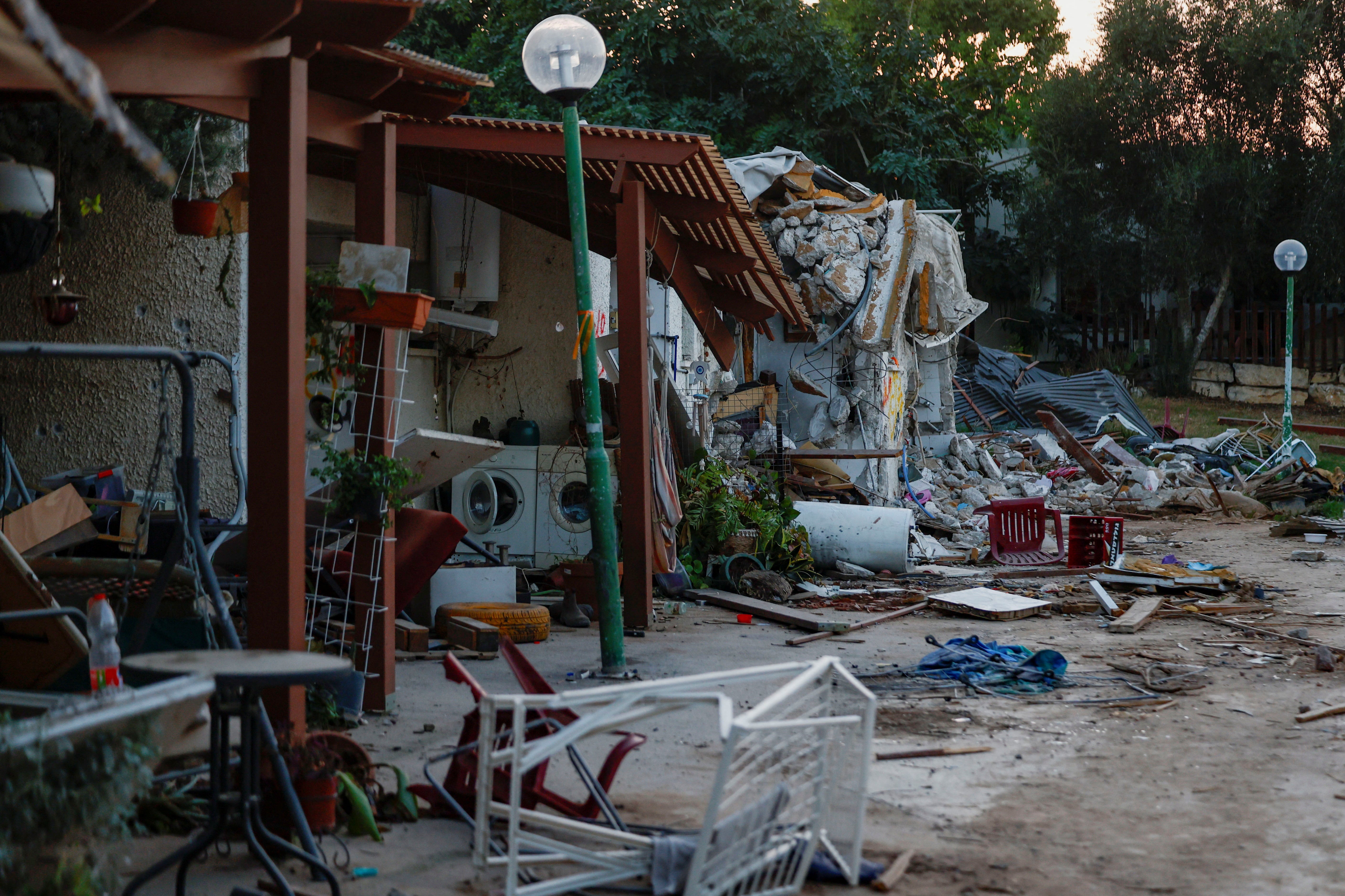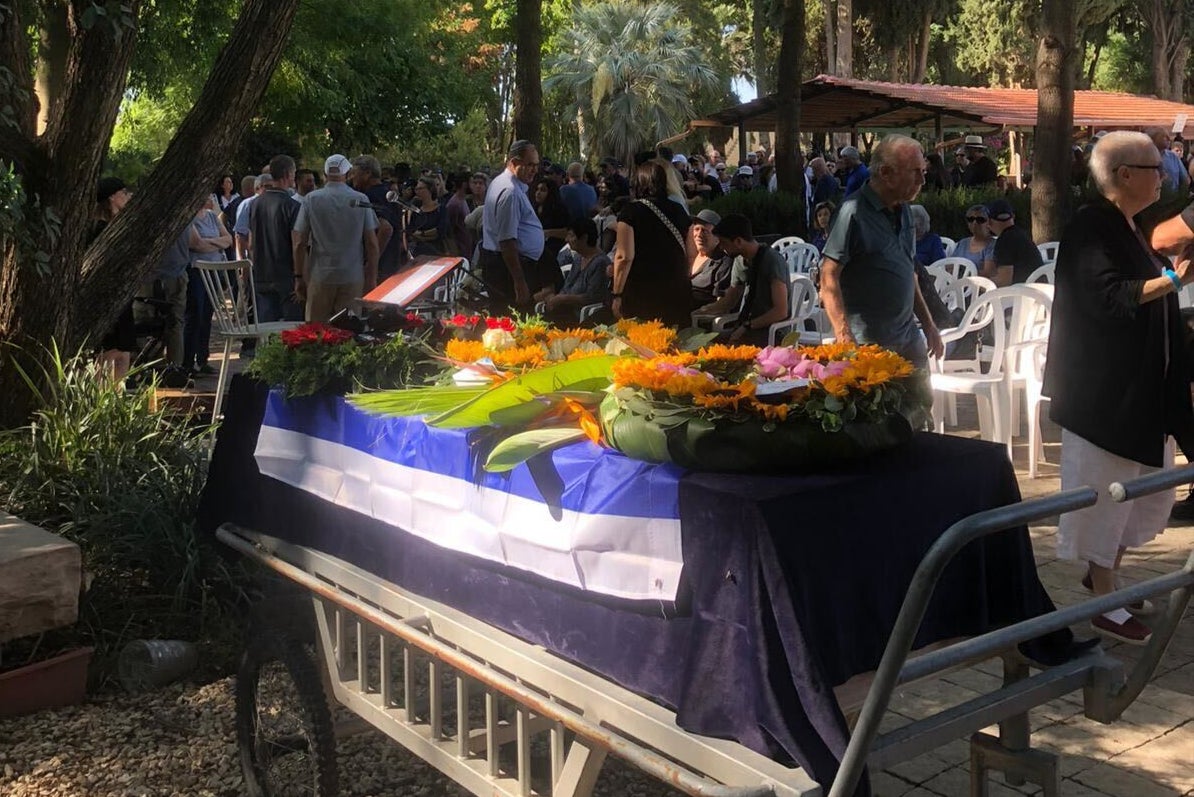Family reveals heartbreak over son who dived on Hamas grenade to save his fiancée
Hamas killed 59 civilians in the Israeli kibbutz of Kfar Aza during their 7 October attack

Your support helps us to tell the story
From reproductive rights to climate change to Big Tech, The Independent is on the ground when the story is developing. Whether it's investigating the financials of Elon Musk's pro-Trump PAC or producing our latest documentary, 'The A Word', which shines a light on the American women fighting for reproductive rights, we know how important it is to parse out the facts from the messaging.
At such a critical moment in US history, we need reporters on the ground. Your donation allows us to keep sending journalists to speak to both sides of the story.
The Independent is trusted by Americans across the entire political spectrum. And unlike many other quality news outlets, we choose not to lock Americans out of our reporting and analysis with paywalls. We believe quality journalism should be available to everyone, paid for by those who can afford it.
Your support makes all the difference.Netta Epstien was just a month shy of his 22nd birthday when he was killed by Hamas.
No-one knows if it was the exploding grenade the young man had thrown himself on to protect his fiancé or the bullets Hamas intruders fired at him that ended his life.
Earlier that day, on 7 October, roughly 250 Hamas militants had crossed over the seven-metre fence surrounding Gaza and rushed the four miles to the nearby Israeli kibbutz, Kfar Azar.
The young couple lived in an intimate social space, designed as a community for 18-25 year olds. It was known as a lively area where its inhabitants regularly “drunk beer and listened to music together”.
Over the next couple of days, though, rampaging through the wider kibbutz, Hamas slaughtered 59 civilians, Netta among them, and took 18 hostages back to Gaza.

Netta and his fiance, Irene Shavit, 22, were hiding in their safe room when they heard the first signs of Hamas militants inside their small home at 11.30am.
“They broke our windows in the living room. Then they opened the safe room, where Netta and I were,” Ms Shavit said. “We had locked it from inside but you can open it from the outside.”
Two grenades were then thrown into the small safe room. The explosions injured Ms Shavit’s legs.
“And then they threw the third one,” Ms Shavit said. “And Netta jumped on it.”
Ms Shavit and Netta’s mother Ayalet Epstein, 50, spoke to The Independent on Friday, a day after their fiance and son would have celebrated his turning 22.

They were on their way to Anfield to see Netta’s favourite football team Liverpool play against Brentford, a trip Netta was originally supposed to take with Ms Shavit. She had bought the tickets for him for his birthday.
In the five weeks since the 7 October Hamas attack, more than 1,400 Israelis have been confirmed killed during that incursion.
In Gaza, retaliatory Israeli airstrikes and a subsequent invasion of the enclave have killed more than 11,000 people, including roughly 4,500 children, according to the Hamas-run health ministry.
Pro-Palestine protests across the UK, the wider West and the Arab region have demanded an immediate ceasefire to stop the killing. Israeli forces, led by their war cabinet and an unpopular prime minister Benjamin Netanyahu, have denied such a possibility.
But for Ms Shavit and Ms Epstein, their concern is the “deep grief” felt by them and so many of their Israeli peers in Kfar Aza.

“We lost in total five members of our family,” Ms Epstein said. “My mother-in-law, my two brothers-in-law, my nephew and Netta, of course.
“One of my close friends and her daughter, who was close friends with my daughter - they grew up with each other - are also gone. I haven’t even had a chance to grieve for them because there is so much happening.”
Ms Epstein spent “30 horrible hours” hiding in the safe room of her father-in-law’s home before she was rescued.
She had already found her mother-in-law “lying on the porch, dead”, having been shot “in cold blood from a very short distance” by members of Hamas.
She had previously been told that her mother-in-law had simply slipped and injured herself, and had defied the air raid sirens in the kibbutz to go and help her.
An hour later, from inside her father-in-law’s safe room, she found out that her husband’s brother had died.
A few hours after that, she received a text message from Ms Shavit.

After the Hamas “terrorists” had killed Netta, they had let off a fourth grenade and set fire to the safe room while Irene was still inside.
“They didn’t come into the safe room. They stayed in the living room for some reason,” Ms Shavit said. “That’s why they did not see me. Then they threw the fourth grenade that started a fire inside the safe room.
“I texted a friend to say ‘There is a fire. What should I do now? I cannot put it out because they will know I am here. I cannot do anything.’ So I took a bullet and put it on my nose, and I waited.
The Hamas men loitered in the living room, still unaware of Irene. She heard them “open the fridge”. But they didn’t enter the safe room.
When they eventually left, she rushed into the living room, retrieved her non-alcoholic Victoria Secret perfume, and used it to extinguish the fire engulfing the safe room where Netta lay.
Afterwards, she said: “I went under the bed behind Netta and no-one saw me.

“The terrorists came back later after the Israeli soldiers engaged them. But they didn’t see me. They only saw Netta. They didn’t see the blue eyes watching them all over.
“I was rescued about five hours later. I was the first one that came out from the kibbutz.”
Ms Shavit may have been the first to be rescued, but she was one of only two people found alive in her complex.
In many ways, she was lucky. But that is not how she sees it.
“I feel guilty. Maybe I could have done something,” she said. “Maybe if I did not hide, maybe if I went to Netta immediately, maybe I could have stopped the bleeding. Maybe I could have done something.
“Maybe if I fought with the soldiers to let them take me with him, maybe the doctor could have done something. Maybe - but no. I didn’t. I stayed quiet.”
“Next week,” she said, “I will go back to that apartment and take everything with me because I feel I left him behind”.
As Ms Epstein, a mother-in-law forever in waiting, stroked Ms Shavit’s shoulder, the young woman added: “They say I don’t need to feel guilty, but I don’t think that feeling will go away.”
Join our commenting forum
Join thought-provoking conversations, follow other Independent readers and see their replies
Comments